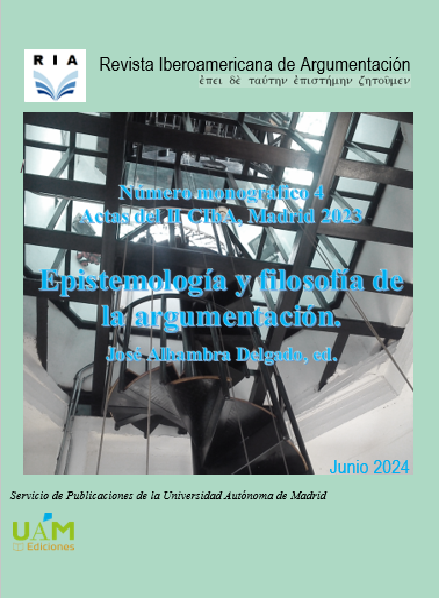Keywords:
argumentation, fallacy, speech acts, intentionality, pragmatics, question, rhetoricCopyright (c) 2024 Revista Iberoamericana de Argumentación

This work is licensed under a Creative Commons Attribution-NonCommercial-NoDerivatives 4.0 International License.
Abstract
Rhetorical questions are questions asked by the speaker whose answer is obvious or does not exist and, therefore, the speaker asks the question without the intention of receiving an answer. It is necessary to analyse and offer a pragmatic explanation of how these questions work and how speakers use them. I develop two possible explanations of how these questions work: one based on speech act theories, and one based on speakers' intentions and apply the proposal based on speech act theory. Moreover, rhetorical questions can have different uses and goals. I distinguish two uses: conversational uses with the aim of modulating the force of the speaker's message and argumentative uses related to the activity of arguing. Within argumentative uses, I distinguish three uses: the expression of arguments (premises or conclusions) and the use of presuppositions.
Downloads
References
Brown, P. & Levinson, S. (1978). Politeness: some universal in language usage. Cambridge University Press.
Copi, I., Cohen, C. and McMahon, K. (1953). Introduction to Logic. Pearson New International Edition.
Frank, J. (1990). You call that a rhetorical question? Journal of Pragmatics 14, 723-738.
Galindo, J. (2017). Las preguntas en la teoría de la argumentación. The role of questions in argumentation theory. Revista Iberoamericana de Argumentación 15, 24-40.
Grice, P. (1975). Logic and Conversation, En: P. Cole & J. L. Morgan (Eds.), Syntax and semantic (Ch. 3, Speech Acts). London: Academic Press.
Greco, S. (2003). When presupposing becomes dangerous. Studies in Communication Sciences 3 (2), 217-234.
Huddleston, R. & Pullum, G. (2002). The Cambridge Grammar of the English Language. Cambridge: Cambridge University Press.
Ilie, C. (2015). Questions and questioning. In The International Encyclopedia of Language and Social Interaction, 1257-1271.
Searle, J. R. (1969). Speech acts: an essay in the philosophy of language. Londres: Cambridge University Press.
- (1975a). “Indirect Speech Acts”, En: P. Cole & J. L. Morgan (Eds.), Syntax and Semantics, (Ch. 3 Speech Acts). London: Academic Press.
- (1975b). “A Taxonomy of Illocutionary Acts”, en K. Gunderson Language, Mind and Knowledge. Minnesota Studies in the Philosophy of Science, University of Minnesota Press.
Stalnaker, R. (1974). Pragmatic Presuppositions, En: M. Munitz and P. Unger (Eds), Semantics and Philosophy (pp. 197–214). New York University Press.
Walton, D. (1999). The Fallacy of Many Questions: On the Notions of Complexity, Loadedness and Unfair Entrapment in Interrogative Theory. Argumentation 13, 379-383.
